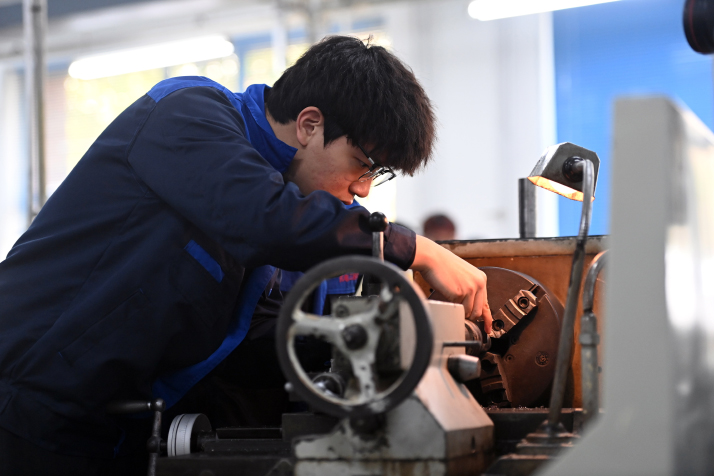| China |
| University graduates embrace vocational training for brighter job prospect | |
|
|
 A student majoring in clock and precision manufacturing at Tianjin Modern Vocational Technology College in Tianjin Municipality adjusts equipment at a practice center at the college on November 12, 2024 (XINHUA)
Wang Xiao (a pseudonym) remembers the scene vividly when he enrolled at Taiyuan Wantong Vocational Skills School in Taiyuan, Shanxi Province, this May. Stepping onto the campus, he was greeted not with the sprawling green lawns and grand, imposing teaching buildings commonly seen in universities, but rather with a cluster of highly specialized training facilities, hi-tech equipment and the operational hum of machinery. Though initially daunted by the fast-paced instruction, Wang felt a surge of excitement. "Finally, I can get my hands on real equipment," he told China Newsweek magazine. Having graduated with a bachelor's degree in environmental engineering from a university in Shanxi last year, Wang opted against a career in his field. He instead set his sights on the electrical automation industry, drawn by its broader career opportunities. "Electrical automation is quite popular and offers broader employment prospects. I'm eager to solve real-life problems with my own hands and make a living through technology," he said. Discovering online that vocational schools are a viable path for career change, he enrolled in an intensive eight-month program. Wang's decision reflects a broader societal shift. With more and more people participating in higher education in China, "diploma inflation" is increasingly evident. Statistics from the Ministry of Education show a record 12.22 million students graduated from university in 2025, diluting the advantage of holding a bachelor's degree. Simultaneously, high-end manufacturing faces a shortage of skilled workers. While companies urgently seek practical problem-solvers, many bachelor's graduates lack hands-on experience, leading to the predicament of "wanting a job but not having the skills." Xu Ling, Vice President of Guangdong Polytechnic Normal University, told CPPCC Daily, a newspaper affiliated with the country's top political advisory body—the Chinese People's Political Consultative Conference (CPPCC) National Committee—that moving from a bachelor's to a vocational qualification is not a downgrade, but a capability upgrade. She explained that as industries evolve and technology advances, the job market demands more skilled, versatile professionals. She views young people actively acquiring technical skills as a rational "reskilling."  Huang Xueyan (front right), a teacher in the culinary program at the Hainan Tibetan Autonomous Prefecture Vocational and Technical School in Qinghai Province, guides students in a baking class on December 17, 2024 (XINHUA)
Opportunities and challenges The growing challenge of securing employment is one of the main factors driving this trend. Lin Beilei (a pseudonym), for instance, graduated with a bachelor's degree in human resource management from a private college in a small city in 2023. Unable to find a job in her city, she enrolled in a two-year mining electromechanical engineering program at a local vocational school. "After I graduate from vocational school, I will be able to find a job with a state-owned enterprise," Lin told China Newsweek, highlighting the direct career path vocational training offers. Beyond the necessity of finding employment, some bachelor's degree holders with prior work experience are pursuing vocational training to enhance their skills. An Mengyi, who studied communications at university, explained to Workers' Daily newspaper that after two years in the workforce, she identified a gap between her academic learning and her job requirements, and her income was not ideal. Consequently, she chose to study high-speed train maintenance Technology at Zhengzhou Railway Vocational and Technical College, a program known for its high demand in the job market. However, the decision to reskill is not without its challenges, as multiple students shared with China Newsweek. Wang, for instance, revealed a dual internal struggle: "For me, there's the issue of pride. My classmates are either pursuing master's degrees or looking for jobs. If I go to vocational school, people will say I wasted my bachelor's degree," he said. "Additionally, there's the risk. What if I spend time and money and still can't find a job?" This sentiment highlights the societal pressures and personal anxieties associated with diverging from traditional post-graduate pathways. Lin echoed this hesitation, "At first, I wasn't willing to accept it either. But after all, pride can't put food on the table." The transition from university to technical college also requires students to adapt to a curriculum heavily focused on hands-on practical training. Mastering these practical skills demands time and a different learning approach. Han Yan, a university graduate now studying mechatronics at Qingdao Technicians College, shared his progress with Workers' Daily: After just half a year, he can operate a lathe and perform fundamental tasks like cutting and drilling. Reconsidering education The phenomenon of college graduates enrolling in vocational schools has gained strong policy support recently. From June to August this year, Guangdong, Zhejiang and Shandong provinces have introduced policies supporting vocational colleges to offer programs for university students. For instance, the Human Resources and Social Security Department of Guangdong Province proposes setting up a one-year technician program for those with a bachelor's or master's degree. The influx of students also poses higher demands on vocational colleges. Xu said that vocational colleges should accelerate their transformation and upgrading. "Facing these students with higher academic backgrounds, clear learning objectives and strong practical needs, vocational colleges need to make adjustments in curriculum design, teaching models and faculty structure," she said. Qingdao Technicians College has launched joint training programs with several well-known enterprises. They jointly develop training plans guided by job competencies and create courses based on real work scenarios. "This deep integration ensures seamless alignment between learning content and actual enterprise needs," Zhang Qiusheng, Party Secretary of Qingdao Technicians College, told CPPCC Daily. Graduates from the school's vocational program for university students are mainly employed by renowned enterprises such as Shandong Port Group Co. Ltd. and Qingdao Metro. Their employment rate exceeds 98 percent, their salaries are generally higher than the average for fresh graduates, and they quickly grow into backbone forces within their companies. The bright employment prospects lead to a pertinent question: Should bachelor's degree holders, who achieve better employment prospects through vocational reskilling, have chosen vocational education directly after high school? Wang said: "Knowledge is the foundation, and skills are the tools. Tools without a foundation cannot take you far." Kuang Ying, a professor specializing in vocational education research at the Institute of Vocational and Adult Education at East China Normal University, said that this provides an opportunity for reconsideration. "For many people, the ultimate goal of education is to find an ideal job. Vocational education, with its continuously improving integration between industry and education, can provide a sense of employment security." Copyedited by G.P. Wilson Comments to jijing@cicgamericas.com |
|
||||||||||||||||||||||||||||
|